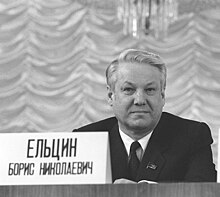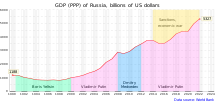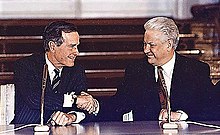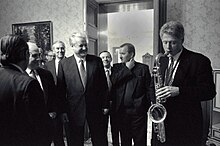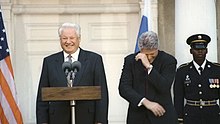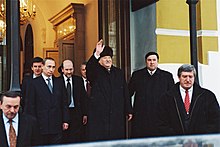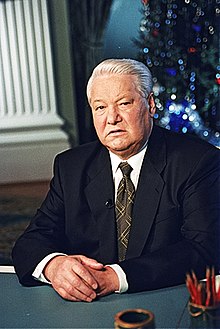Boris Yeltsin
Borís Nikolayevich Yeltsin (in Russian, Николаевич Ельцин, ![]() pronunciation (?·i)Butká, oblast of the Urals (now the Oblates of Sverdlovsk), Soviet Union; February 1, 1931-Moscow, Russia; April 23, 2007) was a Russian politician, who served as President of Russia between 1991 and 1999. He also held the post of president of the Government from 1991 to 1992, and was the penultimate to serve as president of the Supreme Soviet of the Russian Federation from 1990 to 1991.
pronunciation (?·i)Butká, oblast of the Urals (now the Oblates of Sverdlovsk), Soviet Union; February 1, 1931-Moscow, Russia; April 23, 2007) was a Russian politician, who served as President of Russia between 1991 and 1999. He also held the post of president of the Government from 1991 to 1992, and was the penultimate to serve as president of the Supreme Soviet of the Russian Federation from 1990 to 1991.
On July 12, 1990, during the celebration of the XXVIII Congress of the Communist Party of the Soviet Union, Boris Yeltsin announced his withdrawal from the Communist Party of the Soviet Union. In the presidential elections of June 1991, Yeltsin, Presenting himself as an independent, he is elected president of the Russian Soviet Federative Socialist Republic with 58% of the vote.
In August 1991, Yeltsin won international plaudits for promoting himself as a democrat and for challenging the August 1991 coup attempt by communist hardliners in the Soviet government and in the KGB. Following the dissolution of the Soviet Union in December 1991, Yeltsin vowed to transform Russia's socialist economy into a free market economy and implemented economic shock therapy, price liberalization, and privatization programs. Due to the privatization method, a good part of the national wealth fell into the hands of a small group of oligarchs.
The Yeltsin era was marked by widespread corruption, economic collapse, two wars in Chechnya, and enormous social and political problems affecting Russia and other former Soviet Union states. During the first years of his presidency, many of Yeltsin's political supporters turned against him, and Vice President Aleksandr Rutskoi denounced the reforms as "economic genocide". Constant clashes with Parliament culminated in Russia's October constitutional crisis. 1993, when Parliament tried to remove Yeltsin from office and he, in response, besieged the Russian White House, in which hundreds of people died. Yeltsin got rid of the existing constitution, temporarily banned political opposition, and went ahead with his economic experimentation. He then introduced a new constitution with strong presidential power, which was approved by a controversial referendum before the end of the year.
He was re-elected in 1996, defeating Gennady Zyuganov of the revived Communist Party. However, Yeltsin never regained his initial popularity after a series of economic and political crises in Russia during the 1990s.
On December 31, 1999, Yeltsin made a surprise announcement of his resignation, leaving the presidency in the hands of his successor, then-Prime Minister Vladimir Putin. Yeltsin left office widely unpopular with the Russian population, according to some estimates his approval ratings on leaving office were as low as 2%.
Early Years
Boris Yeltsin was born into a humble family in the village (selo) of Batuka, in Sverdlovsk Oblast, in 1931. During Stalin's rule, his father Nikolai Yeltsin was convicted of anti-Soviet agitation in 1934 and served a sentence three years in the Gulag. After his release, he was temporarily unemployed and began working in the construction industry. His mother, Klavdiya Vasilievna Yeltsina, worked as a seamstress. His paternal grandfather had been a kulak..
At the young age of twelve, he suffered an accident that destroyed part of his left hand: apparently he and some of his friends had tried to disarm a grenade they had found in a weapons store. Due to the lack of of fingers, he could not serve in the army. Yeltsin studied at the Pushkin secondary school, Perm region. In his student years he was an active volleyball player. In 1952, he became the coach of the volleyball team. He then continued his studies at the Ural State Technical University, graduating in construction in 1955. Upon completion of his studies, Yeltsin was offered to teach at the institution, but he turned it down to go into construction.
Political rise
Yeltsin began working in the construction industry. Due to Yeltsin's attitudes, he was chosen to be chief engineer, however, because he was not a member of the Communist Party of the Soviet Union (CPSU), he was given training to present his candidacy for Party membership. In 1960, Yeltsin wrote an autobiography as part of the requirements for joining the Party. In his autobiography, Yeltsin omitted to have been the grandson of a kulak.In 1961 he was admitted into the Party. In 1975, he was elected secretary of the CPSU Sverdlovsk regional committee, responsible for the region's industrial development.
Chairman of the Russian SFSR
On June 12, 1990, the Russian Congress of People's Deputies approved the Declaration of State Sovereignty of the Russian SFSR. On July 12, 1990, during the celebration of the XXVIII Congress of the Communist Party of the Soviet Union, Boris Yeltsin announces his abandonment of the CPSU. Presenting himself as an independent in the first multiparty elections, held on June 12, 1991, he accedes to the Presidency of the Russian SFSR by obtaining 58% of the votes. He becomes the chairman of the RSFSR on July 10 of the same year.
On August 19, 1991, hardline communists led by KGB director Vladimir Kryuchkov attempt a coup against USSR President Mikhail Gorbachev, who is arrested at his summer residence (dacha) in Forós (Crimea), while Yeltsin goes to the Moscow Parliament to challenge the coup plotters. Surrounded by soldiers, he manages to call popular demonstrations that would make the rebel troops give up supporting the coup. Yeltsin was at the political pinnacle of it, giving a memorable speech from the turret of a tank.
By August 21, most of the coup leaders had left Moscow. Gorbachev was "rescued" from his captivity in the Crimea and returned to Moscow. Despite his return to office, Gorbachev controlled neither the Soviet Union nor the Russian SFSR. Yeltsin was already the undisputed leader of Russia, achieving signs of support from various parts of the world. At the end of 1991, Yeltsin orders to seize control of the Soviet ministries and declares the CPSU illegal on Russian territory.
On August 24, 1991, the Verkhovna Rada of Ukraine approves the Ukrainian Declaration of Independence. The rivalry between the president of the USSR, Mikhail Gorbachev, and the president of the Russian SFSR, Boris Yeltsin, grows. A week later, Boris Yeltsin meets with Ukrainian President Leonid Kravchuk and Belarusian leader Stanislav Shushkevich at Belovézhskaya Pushcha. At that meeting, the dissolution of the USSR is declared and the establishment of the Commonwealth of Independent States in its place through the Belavezha Treaty.
On December 24, the Russian Federation takes over the USSR's seat at the United Nations. The next day, the president of the USSR, Mikhail Gorbachev, resigns, and the USSR ceases to exist.
President of the Russian Federation
Radical reforms
Just days after the dissolution of the Soviet Union in December 1991, Boris Yeltsin decided to embark on a radical economic reform program, with the goal of restructuring Russia's economic system—turning the world's largest command economy into a free market. During early discussions of this transition, Yeltsin's advisers debated issues of speed and sequence, with an apparent division between those in favor of a rapid approach and those in favor of a gradual or slower approach.
In late 1991 Yeltsin turned to the advice of Western economists and Western institutions such as the IMF, the World Bank, and the US Treasury Department, which had developed a standard policy recipe for transition economies over the decade. of 1980. This political recipe came to be known as the "Washington Consensus" or "shock therapy," a combination of measures intended to liberalize prices and stabilize the state budget. Such measures were tried to be implemented in Poland and so the supporters of "shock therapy" felt that the same could be done in Russia. Some Russian politicians were skeptical that it was the way forward, but the approach was favored by Yeltsin's deputy, Yegor Gaidar, a thirty-five-year-old Russian economist with a leaning toward radical reform.
On January 2, 1992, Yeltsin, acting as his own prime minister, ordered the liberalization of foreign trade, prices, and currency. At the same time, he pursued a policy of "macroeconomic stabilization," a regime of severe austerity designed to control inflation. Under Yeltsin's stabilization program, interest rates were raised to extremely high levels to bolster money and tighten credit. Already to reduce state spending and bring revenue into balance, he sharply raised new taxes, sharply cut government subsidies to industry and construction, and made deep cuts in state spending on welfare.
In early 1992, prices soared across Russia and a deep credit crunch led to the closure of many industries and a prolonged depression. The reforms devastated the standard of living of much of the population, especially groups dependent on Soviet-era state subsidies and social welfare aid programs. Through the 1990s, Russia's GDP it fell 50 percent, vast sectors of the economy were wiped out, inequality and unemployment rose dramatically, while incomes declined. Hyperinflation, caused by the free monetary policy of the Central Bank of Russia, wiped out a lot of personal savings, and tens of millions of Russians were plunged into poverty.
Some economists argue that in the 1990s Russia suffered a more severe economic recession than the United States or Germany had suffered six decades earlier in the Great Depression. Even some Western economists such as Marshall Goldman and Russian commentators they widely blamed Yeltsin's Western-backed economic program for the country's disastrous economic performance in the 1990s, causing many politicians to quickly begin distancing themselves from the program. In February 1992 Russian Vice President Aleksandr Rutskoi denounced Yeltsin's program as "economic genocide". In 1993 the conflict over leadership reform escalated Yeltsin on the one hand, and the opposition to the radical economic reform in the Russian Parliament.
Confrontation with Parliament
Also in 1992, Yeltsin fought with the Supreme Soviet of Russia and the Congress of the Deputies of the People of Russia for control over government, government policy, government banking and property. In the course of 1992, the president of the Russian Supreme Soviet, Ruslan Jasbulátov, opposed the reforms, even though he claimed to support Yeltsin's general objectives. In December 1992, the 7th Congress of the Deputies of the People of Russia succeeded in rejecting the candidacy endorsed by Yeltsin of Yegor Gaidar for the position of Prime Minister of Russia. An agreement was negotiated by Valery Zorkin, president of the Constitutional Court, which included the following provisions: a national referendum on the new Constitution; the Parliament and Yeltsin would elect a new head of government, to be confirmed by the Supreme Soviet; and the Parliament would stop making constitutional amendments that would change the balance of power between legislative and executive branches. Finally, on December 14, Viktor Chernomyrdin, widely regarded as a compromise figure, was confirmed in office.
However, the conflict soon escalated, with Parliament changing its decision before a referendum was held. Yeltsin, for his part, announced in a televised address to the nation on March 20, 1993, that he was going to assume certain "special powers" to implement his reform program. In response, the hasty convening of the 9th Congress of People's Deputies attempted to remove Yeltsin from the presidency via impeachment on March 26, 1993. Yeltsin's opponents mustered more than 600 votes for removal, but fell by 72 votes short of the required two-thirds majority.
During the summer of 1993, a dual power situation developed in Russia. Since July, two separate Chelyabinsk Oblast administrations have functioned side by side, after Yeltsin refused to accept the newly elected parliament in favor of the region's leadership. The Supreme Soviet carried out its own foreign policy, issuing a statement on the status of Sevastopol.
In August, a commentator reflected on the situation as follows: "The president issues decrees as if there was no Supreme Soviet, and the Supreme Soviet suspends decrees as if there were no presidents." (Izvestia13 August 1993).
On 21 September 1993, Yeltsin announced in a televised speech his decision to dissolve the Supreme Soviet and the People's Congress by decree.
In his Yeltsin speech he declared his intention to rule by decree until the election of the new Parliament and a referendum on a new Constitution, which led to the constitutional crisis of October 1993. On the night after Yeltsin's televised speech, the Supreme Soviet declared Yeltsin as a removable president, in violation of the 1978 Russian Constitution, and Vice President Aleksandr Rutskói swore as Acting President.
Between September 21 and 24, Yeltsin was confronted by major popular riots, encouraging supporters of Parliament. Moscow saw what amounted to a spontaneous mass insurrection of tens of thousands of anti-Yeltsin protesters marching in the streets determinedly seeking help from the forces defending the Parliament building. The demonstrators were protesting the new and terrible conditions of life under Yeltsin. Since 1989 GDP has halved. Corruption was rampant, violent crime was on the rise, medical services were collapsing, food and fuel were becoming increasingly scarce, and life expectancy was falling for all but a very small handful of the population; on the other hand, Yeltsin was increasingly considered guilty.
By early October, Yeltsin had secured the support of the Russian Army and the Interior Ministry. In a massive show of force, Yeltsin called in tanks to bomb the Russian White House, the seat of Parliament. The attack on the Russian Parliament building left 500 dead and more than 1,000 injured.
When the Supreme Soviet was dissolved, elections for the newly established Parliament, the State Duma, were held in December 1993. Candidates associated with Yeltsin's economic policies were overwhelmed by a huge anti-Yeltsin vote, most of which was split between the Communist Party and ultranationalists. However, the referendum held at the same time approved the new Constitution of the Russian Federation, which considerably expanded the powers of the president, giving Yeltsin the right to appoint members of the government, to fire the prime minister and in some cases, to dissolve the Duma.
Chechen War
In December 1994, Yeltsin ordered a military invasion of Chechnya, in an attempt to restore Moscow's control over the republic. Nearly two years later, Yeltsin withdrew federal forces from devastated Chechnya in a 1996 peace deal brokered by Aleksandr Lébed, then Yeltsin's security chief. The peace agreement allowed greater autonomy but not the independence of Chechnya.
Privatizations and the rise of "oligarchies"
After the dissolution of the Soviet Union, Yeltsin promoted privatization as a way to spread ownership of shares in former state-owned companies as widely as possible to build political support for his economic reforms. In the West, privatization was seen as the key to the transition from communism in Eastern Europe, ensuring a swift dismantling of the Soviet-era command economy to make way for "free market reforms." In the 1990s, Anatoly Chubais, Yeltsin's deputy for economic policy, emerged as one of the leading advocates of privatization in Russia.
In late 1992, Yeltsin launched a free voucher program as a way to get mass privatization off the ground. Under such a program, vouchers (voucher), each with a nominal value of around 10,000 rubles, were distributed to all Russian citizens for the purchase of shares of selected state-owned companies. Although each citizen initially received a voucher of equal face value, within a few months most of them converged in the hands of intermediaries who were willing to buy them for immediate cash.
In 1995, Yeltsin struggled to finance Russia's mounting foreign debt and gain support from Russia's business elite for his candidacy in the presidential election in early 1996. The Russian president prepared for a new wave of privatization by offering shares in some of Russia's most valuable state-owned companies in exchange for bank loans. The program was promoted as a way to speed up privatization and guarantee the government a much-needed infusion of cash to cover its operational needs.
However, the offers were effectively gifts of valuable state assets to a small group of financial, industrial, energy, telecommunications and media magnates who came to be known as “oligarchs” in the 1990s. This was because people sold their vouchers for cash and these were bought by a small group of investors. In mid-1996, substantial ownership shares in large firms were bought at very low prices by a handful of people. Boris Berezovsky, who controlled significant stakes in several banks and national media outlets, emerged as one of Yeltsin's most prominent supporters. Along with Berezovsky, Mikhail Khodorkovsky, Vladimir Potanin, Vladimir Bogdanov, Rem Vyakhirev, Vagit Alekperov, Aleksandr Smolensky, Viktor Vekselberg, Mikhail Fridman and a few years later Roman Abramovich, they are regularly mentioned in the media as Russia's oligarchs.
KAL Flight 007
On December 5, 1991, Senator Jesse Helms, a ranking minority member of the US Senate Foreign Relations Committee, wrote to Boris Yeltsin about US soldiers who were prisoners of war or missing. in action. "The situation of the thousands upon thousands of American servicemen who are in the hands of the Soviet and other communist forces, and who have never been repatriated after every major war of this century, is a matter of grave concern to the American people."
Yeltsin would ultimately respond with a statement made on June 15, 1992, when interviewed aboard his presidential jet en route to the United States, "Our files have shown it to be true—some of them were transferred to the territory of the Soviet Union and were kept in labor camps...—We can only assume that some of them may still be alive." On December 10, 1991, five days after Senator Helms had written to him Yeltsin about the US military, he turned to Yeltsin again, this time about Korean Air Flight 007, requesting information on possible survivors, including Georgia Congressman Larry McDonald and their whereabouts.
One of the greatest tragedies of the Cold War was the overthrow of Korean Airlines' 007 flight by the armed forces of what was then the Soviet Union on September 1, 1983... The tragedy of KAL's 007 flight was one of the most tense incidents in the Cold War. However, now that the relations between our two nations have improved substantially, I think it is time to solve the mysteries surrounding this event. Clearing air on this issue could help to further improve relationships.
In March 1992, Yeltsin would hand over the black box of KAL 007 without its recordings to Korean President Roh Tae-woo at the end of the Korean National Assembly plenary session with this statement: "We apologize for the tragedy and we're trying to sort out some unresolved issues."
Yeltsin would ultimately answer on January 8, 1992 for the delivery to the International Civil Aviation Organization (ICAO) of the United Nations, what the Russians had denied for so many years that they possessed: the recordings of the black box KAL's 007 (its digital flight data recorder and cockpit voice recorder).
Yeltsin's openness on POW and MIA issues and KAL Flight 007 may also have signaled his willingness to open up more with the West. In 1992, in what he called the "window of opportunity," he was willing to discuss biological weapons with the United States and admitted that the Sverdlovsk anthrax leak of April 2, 1979, had been caused as a result of an accident at a military installation. The Russian government had maintained that the cause was contaminated meat. The true number of victims in the anthrax outbreak in Sverdlovsk, some 1,368 km east of Moscow, is unknown.
1996 Presidential Election
In February 1996, Yeltsin announced that he would seek a second term in the Russian presidential election in the spring of 1996. The announcement followed weeks of speculation that Yeltsin was at the end of his political career due to problems with health and his growing unpopularity in Russia. As Yeltsin was recovering from a series of heart attacks, national and international observers also noted his occasional erratic behavior. When the campaign began in early 1996, Yeltsin's popularity was close to zero. Meanwhile, the opposition Communist Party of the Russian Federation had already gained ground in the parliamentary vote on December 17, 1995, and its candidate, Gennady Zyuganov, had a strong grassroots organization, especially in rural areas and small towns, and effectively appealed to the memory of the old days of Soviet prestige on the international stage and the national socialist order.
Panic hit Yeltsin's team when opinion polls suggested he could not win the presidency sick; some of his entourage urged him to cancel the presidential election and effectively rule as dictator thereafter. Instead, Yeltsin changed his campaign team, assigning a key role to his daughter, Tatiana Diachenko, and appointing Chubais as campaign manager. The latter, acting as Yeltsin's campaign manager and adviser on Russia's privatization program, used his control of the privatization program as a tool for Yeltsin's re-election campaign.
In the spring of 1996, Chubais and Yeltsin recruited a team of a handful of financiers and media oligarchs to campaign for Yeltsin and ensure him favorable media coverage on national television and in major newspapers. In return, Chubais allowed Russian businessmen to acquire majority stakes in some of Russia's most valuable state assets. The media painted a picture of a fateful choice for Russia, between Yeltsin and a "return to totalitarianism". The oligarchs even played on the threat of civil war if a communist was elected president.
Yeltsin campaigned vigorously, allaying concerns about his health and maintaining a media profile. Increasing his popularity, he vowed to abandon some of his most unpopular economic reforms, increase social spending, end the war in Chechnya, and pay back salaries and pensions. Yeltsin's campaign also received a boost from the announcement of a $10 billion loan to the Russian government from the International Monetary Fund.
Zyuganov, who lacked resources and financial backing like Yeltsin, saw his strong early lead dwindle. After the first round on June 16, Yeltsin appointed popular candidate Aleksandr Lebed, who finished third in the first round, the secretary of the Russian Security Council, dismissing Defense Minister Pavel Grachov at the latter's behest and on June 20, he fired several of his siloviki (former agents of the USSR secret services), including Aleksandr Kórzhakov, his head of presidential security, seen by many as Yeltsin's gray eminence.
In the runoff on July 3, with a 68.9% turnout, Yeltsin got 53.8% of the vote and Zyuganov 40.3%, with the rest (5.9%) voting « against everyone".
Second term
In July 1996, Yeltsin was re-elected as president with the financial backing of influential business oligarchs who derived their wealth from their connections to the Yeltsin administration. Despite winning only 35% of the vote in the first round of voting in the 1996 election, Yeltsin defeated his communist rival Gennady Zyuganov with 54% of the vote in the second round. Later that year, Yeltsin underwent emergency quintuple cardiac bypass surgery and remained in the hospital for months.
During Yeltsin's presidency, Russia received $40 billion in funds from the IMF and other international lending agencies. However, his opponents claimed that most of these funds were stolen by people from Yeltsin's circle and placed in foreign banks.
In 1998, a political and economic crisis arose when the Yeltsin government was defaulting on its debts, leading to panic in financial markets and the collapse of the ruble in the 1998 financial crisis.
During the 1999 Kosovo war, Yeltsin strongly opposed NATO's military campaign against Yugoslavia and warned of possible Russian intervention if NATO deployed ground troops in Kosovo. In televised comments he stated: "I told NATO, the Americans, the Germans: don't push us into military action. Otherwise there will surely be a European and possibly world war."
On May 15, 1999, Yeltsin survived another attempted impeachment trial, this time by the democratic and communist opposition in the State Duma. He was charged with various unconstitutional activities, including signing the Belavezha Treaty, dissolving the Soviet Union in December 1991, coup d'état in October 1993, and starting the war in Chechnya in 1994. None of these charges received a majority. two-thirds of the Duma, which is what is required to start the impeachment process for the president.
On August 9, 1999, Yeltsin fired his prime minister, Sergei Stepashin, and for the fourth time fired his entire cabinet. In Stepashin's place he appointed Vladimir Putin, who was relatively unknown at the time, and announced his desire for Putin to succeed him.
In late 1999 Yeltsin and US President Clinton fell into open disagreement over the war in Chechnya. At the November meeting of the Organization for Security and Cooperation in Europe, Clinton pointed his finger at Yeltsin and demanded an end to the bombings which caused numerous civilian casualties, but Yeltsin immediately walked out of the conference.
In December, during his visit to China to seek support in Chechnya, Yeltsin responded to Clinton's criticism with an ultimatum to the citizens of Grozny. He bluntly uttered the following: “Yesterday, Clinton allowed herself to put pressure on Russia. It seems that for a minute, a second, for half a minute, he has forgotten that Russia has an arsenal of nuclear weapons. He has forgotten about it ». Clinton dismissed Yeltsin's comments, stating: "I didn't think he forgot that the United States was a great power when he disagreed with what I did in Kosovo." It fell to Vladimir Putin to play down Yeltsin's comments and to guarantee the present relations between the United States and Russia.
Resignation and posterity
On December 31, 1999, in a surprise announcement issued at 12:00 midnight on Russian television and recorded on the morning of the same day, Yeltsin declared his resignation and the assumption of Prime Minister Vladimir Putin as president, with the elections to be held on March 26, 2000. Yeltsin apologized for the mistakes he acknowledged having committed during his government and said that Russia needed to enter the new century with new political leaders. He also said: "I want to apologize for your dreams that were never fulfilled, and I would also like to ask forgiveness for not having justified your hopes."
Illness and death
At many times in his political career, Yeltsin's poor health, caused in part by his alcoholism, gave rise to numerous gossip and anecdotes (it was said, for example, that he had been seen walking around Washington in his underwear, completely drunk), caused him serious problems (especially heart problems, suffering several attacks and going through a five-fold bypass in mid-1996). Boris Nemtsov, Yeltsin's collaborator, stated that the medicines he was taking were incompatible with even small amounts of alcohol, which caused him serious side effects. It was said that Yeltsin's peculiar behavior during a visit to Stockholm in 1997 (where he compared Björn Borg's face to Swedish meatballs, and then nearly fell to the ground after taking a shot of champagne) had something to do with with that. This ill health was the main reason that after his resignation, Yeltsin kept a low profile, appearing rarely in public (one of them in the Beslan school massacre). In September 2005, Yeltsin underwent surgery after fracturing his femur in a fall in Sardinia.
Yeltsin died of multiple congestive heart failure in Moscow on April 23, 2007. He was buried two days later at the Novodevichy Cemetery in a massive religious ceremony (the first Russian head of state to be so buried since Alexander III).
After death
Russian President Vladimir Putin declared the day of his burial day of official mourning. He said that thanks to him, Russia had become a free, open and peaceful country in which human rights were respected, and he praised his, according to him, human warmth and courage. The former president of the former Soviet Union, Mikhail Gorbachev, was more made, claiming he had done many good things, but he had also made serious mistakes.
Boris Yeltsin has a statue dedicated to him in Yekaterinburg.
In popular culture
In episode 10 of the eighth season of the animated series The Simpsons titled The Springfield Files, in the scene at Moe's bar, Homer takes a breathalyzer test where he reaches the maximum alcohol level, which is represented by the name of the first president of the Russian federation "Boris Yeltsin", referring to the serious problems of alcoholism that he suffered, and unfortunately he was famous for his disfigurements while intoxicated.
Assessment
Attitude towards Yeltsin in Russia
Public opinion
According to the Public Opinion Foundation, 41% of Russian residents assess Yeltsin's historical role negatively, 40% positively (in 2000, immediately after his resignation, this proportion was 67% against 18%).
According to the Levada Center, 67% in 2000 and 70% in 2006 rated the results of his reign negatively, 15% and 13% positively, respectively.
Opinions of the country's leadership after Yeltsin's resignation
In 2006, Russian President Vladimir Putin said: “You can evaluate the activities of the first president however you want. But, of course, it was precisely at the time when Boris Nikolayevich Yeltsin led Russia that the people of our country, the citizens of Russia, received the main thing for which all these transformations took place - freedom. This is a great historical merit of Boris Nikolayevich... How each of us, including me, would have acted in those conditions",and in 2011 he noted that: "Yeltsin believed in the ideals he defended... People very different people have gathered in this room today, but we all believe in Russia, we strive to build a modern and self-confident country, which Boris Nikolayevich Yeltsin dreamed of."
In 2011, Russian President Dmitry Medvedev noted: “An attentive and impartial reader cannot fail to appreciate the breakthrough that was achieved in the 1990s... Modern Russia should be grateful to Boris Yeltsin for the transformations that he carried out.”
In 2011, the head of the presidential administration, Sergei Naryshkin, said: “Over the years, the importance and power of Boris Nikolayevich as a political leader have only become clearer. The new Russia inherited a difficult legacy. It was necessary not only to overcome the most difficult problems, but also to create a Russian state. The role of the first president was key: he assumed the full weight of responsibility. We are in large part indebted to the first president of Russia for our current achievements."
In 2011, Mikhail Shvidkoi, special presidential envoy for international cultural cooperation, said: “The importance of Boris Nikolayevich cannot be underestimated, the 1990s predetermined the 2000s, Boris Nikolayevich lived up to that great country called Russia".
Opinions of political scientists
In 2010, the Dean of the Faculty of Applied Political Sciences of the Higher School of Economics Mark Urnov stated: “Under Yeltsin, political and economic competition developed in the country, a free press and civil society were formed. People stopped being afraid of the authorities, they learned to say what they think in their eyes. Of course, the transition from totalitarianism to democracy could not go without difficulties and mistakes. Blaming Yeltsin for the collapse of the Soviet Union is stupid: the elites of all the union republics, who had long dreamed of independence from Moscow, were interested in this collapse. The Belavezha Accords may have been concluded too quickly, but the collapse of the USSR was inevitable. The parade of sovereignties, the governor's freemen - all this also happened, but this is not Yeltsin's fault... By the time Yeltsin came to power, the economy was dying. The deficit for everything was growing, foreign exchange reserves tended to zero, and oil cost 8-12 dollars a barrel. Without drastic measures, the country could not be saved from hunger... Thanks to privatization, at the end of the 90s, world-class companies appeared in the country. In the 90s, we did not have such monstrous corruption... Yeltsin was completely non-vengeful, not bloodthirsty. The opponents, who took up arms in 1993, were imprisoned for a while and then released... Of course, Yeltsin's government will go down in the country's history with a plus sign".
Contenido relacionado
Annex:Roman Emperors
Gustavo A. Madero (Mexico City)
Annex: Monarchs of Asturias
